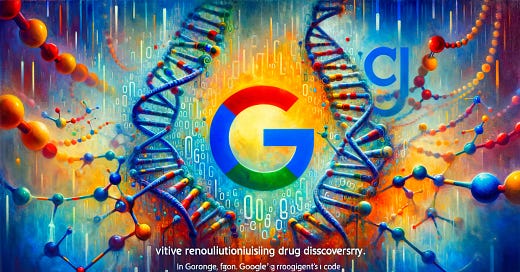Google DeepMind's AlphaFold 3: Revolutionizing Drug Discovery
AlphaFold 3: Paradigm-Shifting AI Technology Transforming Biotech
1. Introduction: AI's Promise in Drug Development
The medical landscape stands on the threshold of a revolution as the advent of Artificial Intelligence (AI) makes its mark in biotechnology. Google’s DeepMind AI research laboratory, in partnership with Isomorphic Labs, has introduced AlphaFold 3, an AI model that promises to transform drug discovery and development. As the next drug you take may be designed by AI, this remarkable technology harnesses the predictive power of machine learning to significantly reduce the time and cost needed to find most appropriate and effective life-saving treatments.
2. The Unseen Connections: Molecule Mapping and Protein Interaction
AlphaFold 3 provides a precise understanding of the complex interactions between proteins and other molecules in the human body. This insight is critical for designing drugs that target diseases more effectively. Demis Hassabis, co-founder of DeepMind, explains: “With these new capabilities, we can design a molecule that will bind to a specific place on a protein, and we can predict how strongly it will bind. It's a critical step if you want to design drugs and compounds that will help with disease.”
3. Accelerating Drug Discovery and Reducing Bottlenecks
Traditionally, drug discovery has been a laborious and time-consuming process involving vast amounts of data, money, and experimentation. However, AlphaFold 3 has the potential to streamline the pipeline by predicting how a proposed drug will affect the body. Dr. Nicole Wheeler, an expert in microbiology at the University of Birmingham, highlights that AlphaFold 3 could “significantly speed up the drug discovery pipeline,” as it reduces the bottleneck of physically producing and testing biological designs.
4. AlphaFold 3: Expanding Predictive Power in Protein Interactions
Since AlphaFold 2's 2021 launch, it has empowered scientists to map cellular machinery, discover new drugs, and unravel every known protein's structure. Despite these successes, John Jumper, who heads AlphaFold’s development at Google DeepMind, faced frequent requests for improved predictions involving proteins interacting with DNA, RNA, and other cellular players. Jumper expressed his desire to “solve their problems.”
On 8 May, AlphaFold 3 was released globally to tackle these challenges by allowing scientists to predict protein interactions with other molecules. To democratize access, the AlphaFold server was launched, enabling non-commercial researchers to freely test hypotheses before committing to real-world experimentation. Jumper emphasises that this server simplifies AI access for biologists, allowing them to explore hypotheses efficiently.
5. Norm-Shattering Potential and the Road Ahead
Despite its promise, there is caution around AI hallucinations and limitations. While the system's norm-shattering conjectures have sometimes proven fruitful in drug development, scientists note that AlphaFold 3 struggles to predict how proteins change shape in response to their environment. This shortcoming could impact drug efficacy in the real world. As “The Guardian” reports, these challenges highlight the need for careful regulation and continued oversight.
6. Conclusion: Optimism with a Note of Caution
AlphaFold 3 is ushering in a paradigm shift in biotech. It reduces the high failure rate in drug development by providing scientists with a comprehensive understanding of the human body's molecular structure. By accelerating the drug discovery process, it opens doors to previously unimaginable medical possibilities. However, this new genie of technology must be carefully regulated to prevent unintended consequences, says Bilwal Sidhu, our US-based Honorary Tech Adviser and a former Googler. With judicious collaboration among stakeholders and robust oversight, AlphaFold 3's remarkable potential can be responsibly harnessed for a future of boundless medical innovation.










